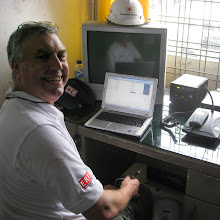As Tom and I have driven through rural Bangladesh we’ve noticed cows and goats everywhere. A lot of the time they’re standing in the middle of the road and we have to slow down and treat them as roundabouts. As we got closer to the end of the first week in November the number of animals increased dramatically. Many were in small markets like the one shown. It turns out there was a reason we saw so many.
Word of warning: All vegans, vegetarians, animal activists, and animal lovers in general may want to quit reading now …
On November 6 and 7 Muslims celebrated one of their most sacred holidays called Eid al-Adha or Festival of Sacrifice. One of the main customs on the morning of the second day (the 7th) is for each family to slaughter a cow or goat or both. This is usually done on the street or road in front of their home and as one person told me “blood is everywhere!” The slain animals are then butchered with one third going to the family that owned the animal, one third going to relatives and friends, and one third going to the needy.
This is a three to five day holiday here in Bangladesh so Tom and I are not working. On Sajit’s advice we are in a resort town called Cox’s Bazar and have escaped all of the slaughter. I’ll report on how much of a resort Cox’s Bazar is in another blog entry.
Now I know I’m hypocritical as I’m a meat eater and I know that animals are slaughtered back home in terrible conditions but I don’t want to see the actual death of the animal. As we travelled over the last week or so the worst thing was to see all these animals enjoying their life and us knowing they only had days to live. I’m sure the last few days of these animals lives was far better than what their cousins face in the feed lots and slaughter houses in North America.










